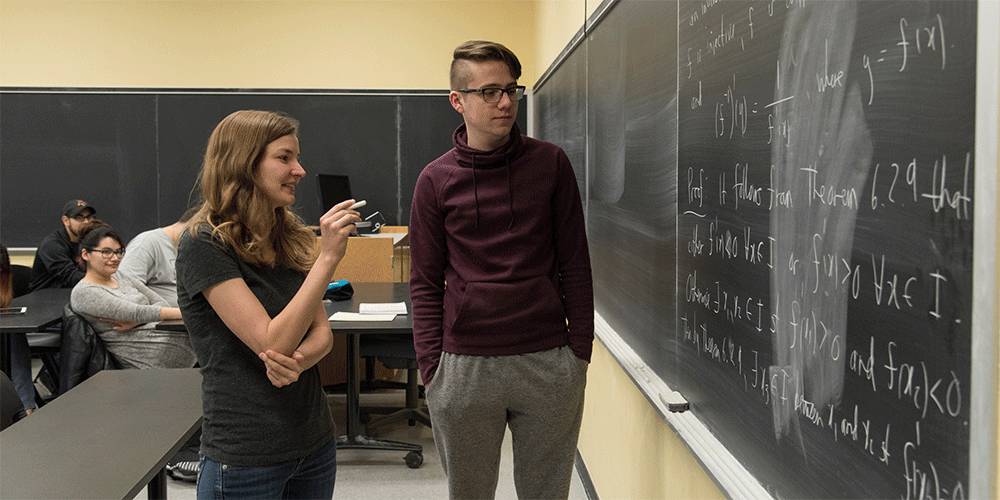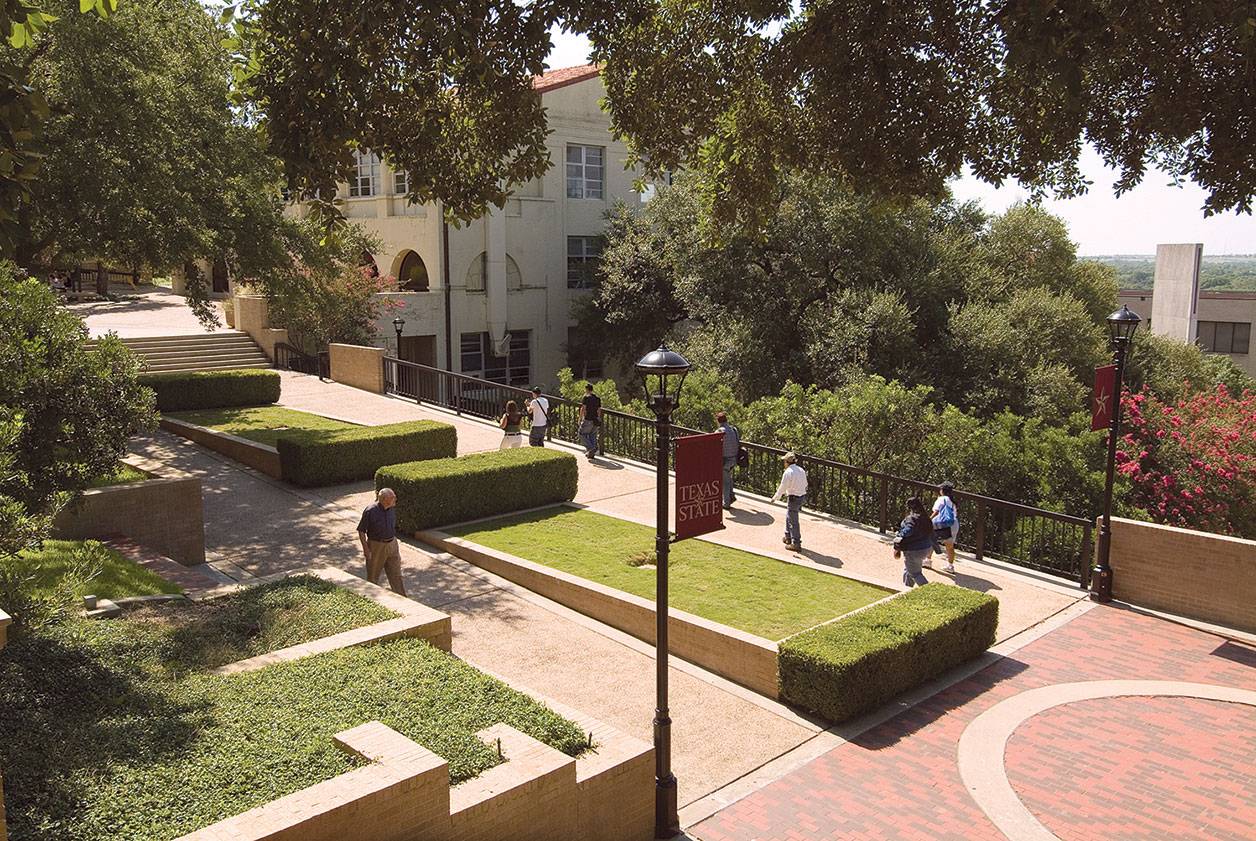Students develop a strong background in mathematics and engage in mathematics research in general mathematics, applied mathematics, or statistics.
Mathematics

Program Overview
Our doctoral program in mathematics gives students the ability to select general mathematics or to concentrate in applied mathematics or statistics. The program includes elements designed to prepare students for both research careers in industry and for the more traditional Ph.D. careers in academia. The program prepares graduates for the modern workforce with elements specifically designed to support multiple career pathways, both in industry and in academia.
Students will gain a breadth of mathematical and statistical knowledge, the ability to produce new innovative research, the ability to write and communicate technical knowledge and disseminate that knowledge to a broad audience, acquire and develop grant writing skills, and practical experience aligned with their chosen long-term professional and career goals.
Course Work
Students complete core courses in general mathematics, applied mathematics, and statistics. Required elective courses are from areas such as algebra, analysis, combinatorics, data science, differential equations, numerical analysis, probability, scientific computing, statistics, and topology. Each student takes a practicum component aligned with their career interests. Students planning to enter academia take coursework in mathematics education.
Students planning to work outside of academia take 9 hours of internship and/or consulting. The culminating research activity is a dissertation. Graduates develop a well-balanced foundation in mathematics and the background needed to do original research in their field. A rich research environment supports each student’s research interests with a variety of weekly seminars and colloquia.
| DEGREE | CONCENTRATION | COURSE WORK | DISSERTATION | TOTAL HOURS* | Location |
|---|---|---|---|---|---|
DEGREE Ph.D. | CONCENTRATION General Mathematics | COURSE WORK 54 hours | DISSERTATION 18 hours | TOTAL HOURS* 72 hours | Location San Marcos |
DEGREE Ph.D. | CONCENTRATION Applied Mathematics | COURSE WORK 54 hours | DISSERTATION 18 hours | TOTAL HOURS* 72 hours | Location San Marcos |
DEGREE Ph.D. | CONCENTRATION Statistics | COURSE WORK 54 hours | DISSERTATION 18 hours | TOTAL HOURS* 72 hours | Location San Marcos |
*Applicants who have completed a master’s degree in mathematics, statistics, or a closely related discipline from an accredited college or university can, upon approval of the program advisor, have up to 30 hours of coursework waived based on courses taken during the master’s degree that closely align with courses in the program.
Program Details
This program allows students to develop advanced training and knowledge in areas including algebra, analysis, combinatorics, data science, differential equations, graph theory, number theory, numerical analysis, probability, scientific computing, statistics, and topology.
Program Mission
The educational objectives of this program include:
- preparing students to identify a given problem, its causes, and possible mathematical or statistical solutions
- preparing students to locate, analyze, and synthesize research and data quickly and apply it to resolve novel problems in new contexts
- preparing students to contribute to a body of knowledge through empirical or theoretical research
- preparing students to teach or instruct in mathematics, applied mathematics, or statistics
Career Options
Emphasis on deep and high-level understanding of the tools of mathematical science, like scientific computing, statistical inference, and optimization, will prepare students for careers in careers in academia and a wide variety of market segments including medicine and pharmaceuticals, manufacturing, engineering of high precision machines, geophysical imaging and oil and gas exploration, critical infrastructure, communication systems and transportation systems, and computer graphics.
Program Faculty
The Department of Mathematics faculty research areas include:
- mathematical logic, model theory, set theory, category theory
- geometric and topological combinatorics, combinatorial commutative algebra
- analysis and applications of PDEs, nonlinear PDEs
- number theory, dynamical systems
- knot theory, quantum invariants, low-dimensional topology
- numerical methods for PDEs
- statistical genetics, mixed models, statistical learning
- genetics and epigenetics, genomic problems, Bayesian methods, hidden Markov models, Markov chain monte carlo algorithms
- derived geometry, Fukaya categories, factorization homology and infinity-categories
- finite group theory and group representation theory
- machine learning, privacy-preserving deep learning, adversarial robustness, generative models
Contact us for general questions about your application, funding opportunities, and more. If you have specific questions after reviewing the program details, contact the program's graduate advisor.

Already know that Texas State is right for you?
Application Deadlines
-
For Entry Prior to Summer 2026
DEADLINES U.S. CITIZEN INTERNATIONAL Fall January 10 January 10 Spring August 10 August 10 -
Effective for Summer 2026 Entry and Beyond
DEADLINES U.S. CITIZEN INTERNATIONAL Fall - Priority January 1 January 1 Fall - Standard August 1 June 1 Spring - Priority September 1 September 1 Spring - Standard November 1 October 1
For important information regarding deadlines and decision timelines, review the Application Policy Information page.
Admission Requirements
The items required for admission consideration are listed below. Additional information for applicants with international credentials can be found on our international webpages.
-
Application
- completed online application
Review important information about the online application.
-
Application Fee
- $55 nonrefundable application fee, OR
- $90 nonrefundable application fee for applications with international credentials
Review important information about application fees.
-
Transcripts & GPA
- Baccalaureate degree in mathematics, statistics, or a closely related discipline from a regionally accredited university. (Non-U.S. degrees must be equivalent to a four-year U.S. Bachelor’s degree. In most cases, three-year degrees are not considered. Visit our International FAQs for more information.)
- Applicants who have completed a master’s degree in mathematics, statistics, or a closely related discipline, from an accredited college or university, with a competitive GPA can, upon approval of the program advisor, have up to 30 hours of coursework waived based on courses taken during the master’s degree that closely align with courses in the program.
- A copy of an official transcript from each institution where course credit was granted.
Review important information about transcripts. Official transcripts, sent directly from your institution, will be required if admission is granted.
-
Test Scores
GRE
- GRE not required, however, applicants whose GPA is not deemed competitive by the program may be offered the opportunity to submit GRE scores for review
Approved English Proficiency Exam Scores
Applicants are required to submit an approved English proficiency exam score that meets the minimum program requirements below unless they have earned a bachelor’s degree or higher from a regionally accredited U.S. institution or the equivalent from a country on our exempt countries list.
- official TOEFL iBT scores required with a 78 overall
- official PTE scores required with a 52 overall
- official IELTS (academic) scores required with a 6.5 overall minimum individual module scores of 6.0
- official Duolingo scores required with a 110 overall
- official TOEFL Essentials scores required with an 8.5 overall
This program does not offer admission if the scores above are not met.
Review important information about official test scores. -
Documents & Other Requirements
- Resume/CV outlining education, work experience, scholarships/grants, publications/presentations, other accomplishments.
- Statement of purpose outlining the applicant’s background and professional goals, including their rationale for pursuing a doctoral degree in mathematics at Texas State background as well as research potential. Letters should address teaching potential for applicants interested in applying for funding as an instructional assistant.
- Three letters of recommendation evaluating the applicant’s professional and academic background as well as research potential. Letters should address teaching potential for applicants interested in applying for funding as an instructional assistant.
- Interviews may be conducted with semifinalists.
Review important information about documents.